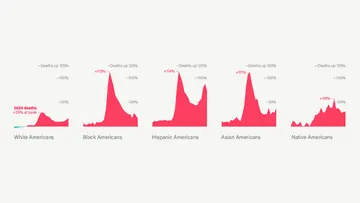This is The Marshall Project’s Closing Argument newsletter, a weekly deep dive into a key criminal justice issue. Want this delivered to your inbox? Subscribe to future newsletters here
Last May, President Joe Biden sat with family members of George Floyd and Breonna Taylor in the White House as he signed an executive order he called the “most significant police reform in decades.”
One of the more notable promises in the order was setting up a “National Law Enforcement Accountability Database,” that would collect detailed information about officers who committed misconduct. The deadline to launch it was Jan. 20, the same day that five Memphis police officers were fired for the beating death of Tyre Nichols — a killing that has once more ignited national debate about policing. The Department of Justice has yet to announce the database, and did not respond to multiple requests for comment on its status.
Deadlines for other initiatives in Biden’s order, like new standards for credentialing police departments, appear to have also come and gone without acknowledgement or public results.
The administration had a very low bar to clear Biden’s promise of “significant police reform” at the federal level, as congressional gridlock has stymied every legislative proposal in recent years. That’s largely why a number of prominent civil rights groups hailed Biden’s executive order as a positive first step, while also complaining that it didn’t go far enough. (Other groups, like the Movement for Black Lives, were more critical, arguing the order represented “minor reforms that tinker on the edges of a racist system.”)
Udi Ofer worked closely with the White House on the order at the time, as director of the American Civil Liberties Union’s justice division. Ofer has since left the ACLU and is a professor at Princeton University’s School of Public and International Affairs. He said the rollout of the initiatives in Biden’s order appears to lack “urgency and level of commitment.” Ofer said there are many people in the administration who care about advancing police reform, but “it can't be a priority only on the anniversary of a police killing or when a new tragedy grabs headlines.”
Such is often the case with police reform efforts. The George Floyd Justice in Policing Act passed the House in 2021 after the historic protests that followed Floyd’s killing. But the bill died in the Senate and was largely forgotten in 2022, as national political attention shifted elsewhere. Many of the bill’s provisions are similar to those in Biden’s executive order — such as the misconduct database — but would carry the weight of federal law in a way that executive orders do not. A new president could undo Biden’s order with the stroke of a pen.
The George Floyd Act would also do some things that the president cannot, like weakening qualified immunity — a legal doctrine that gives police broad protection from civil lawsuits — and lowering the threshold for charging abusive officers with federal crimes.
This week, in the aftermath of Nichols’ death, some of the key lawmakers involved are talking about a new push at bipartisan negotiations. The original proposal did not have a “duty to intervene” provision — requiring officers to step in when others are behaving abusively — but some lawmakers are floating that as an addition now.
At least 17 states have passed duty-to-intervene laws since 2020, including Illinois, Massachusetts and Nebraska — just a few of hundreds of state-level police reform bills that passed in the same period. In Tennessee, home to Memphis, the legislature considered a duty-to-intervene law in 2020, but it did not pass. State lawmakers there are also raising the possibility of a broad police reform package once again.
It’s actually been more than two-and-a-half years since Americans were promised a national police misconduct database. Then-President Donald Trump also signed an executive order in June 2020 that mandated a database of “improper use of force.” That effort stalled under Trump, and the Biden administration halted it as it contemplated its own version.
The database Biden ordered would require federal law enforcement agencies to submit misconduct data, and the federal government would use incentives and encouragement to get state and local agencies to participate.
But such a database has serious limitations for curbing abuse. While several officers indicted in Nichols’ death had a history of minor disciplinary infractions, none had been involved in any kind of incidents that would have landed them on the proposed national database. These kinds of databases are mostly aimed at preventing “wandering officers” who are accused of serious misconduct in one department, from winding up in another department.
Even though the problems with policing in the U.S. run far deeper than what a database like this can capture, it can still be “a part of chipping away at the culture of policing,” said Damon Hewitt, president and executive director of the Lawyers’ Committee for Civil Rights Under Law. “I think it's worthwhile, so long as it is not viewed as an end-all, be-all.” His organization was also involved in helping the White House develop the order, and he hopes that the increased attention will prod the administration to hasten implementation.
The misconduct database is not the first federal effort at tracking police violence to be rolled out slowly or incompletely. In 2015, then-FBI director James Comey called it “embarrassing and ridiculous” that the federal government kept worse data on police killings than efforts by The Guardian and The Washington Post. That same year, the FBI announced an effort to collect use-of-force data, but it didn’t actually begin until 2019.
That program is voluntary and only 66% of agencies nationwide participated last year, limiting how much of the data the FBI can release by law. So even now, lists kept by The Washington Post, the activist group Mapping Police Violence, and by volunteers at Fatal Encounters are much more comprehensive than what the federal government reports.
